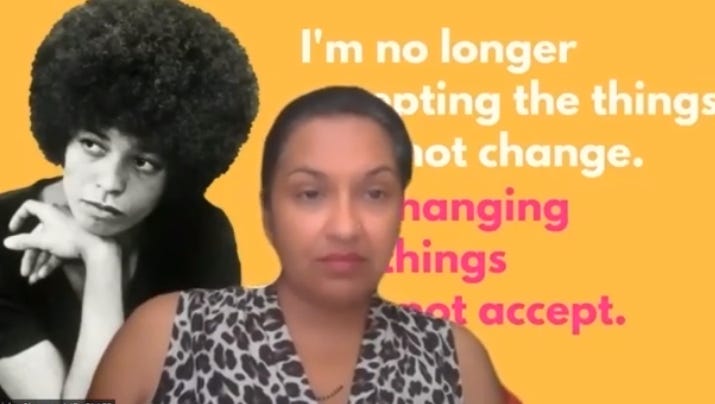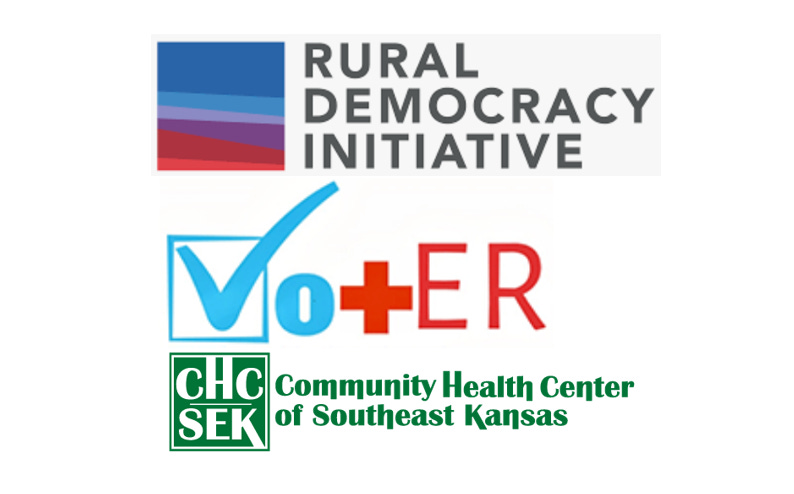Rural Democracy Initiative, VotER, and Community Health Center take credit for defeat of Value Them Both in Crawford County in Aug. 2022
"Dark money" is behind Rural Democracy Initiative and VotER
Updated Feb. 3. See statement at end of article from CHC/SEK CEO Krista Postai.
While researching the Rural Democracy Initiative I stumbled upon a page about the Community Health Center of Southeast Kansas (CHC/SEK) providing “civic health services” to residents of Crawford County, and surrounding counties, for the primary election in Aug. 2022.
What are “civic health services” and why are they provided by the Federally Qualified Health Center (FQHC) in Pittsburg, KS?
CHC/SEK teamed with VotER to provide “civic health services” to defeat the prolife constitutional amendment “Value Them Both” in the Aug. 2022 Kansas primary election in Crawford County.
Rural Democracy Initiative article

The pro-abortion language in the RDI article suggests they turned “Value Them Both” into a “Value One, Not Both” referendum.
The Community Health Center of SE Kansas, serving 1 of 3 residents in their highly rural region, had never run a full voter engagement campaign before this year’s collaboration with Vot-ER. Vot-ER provided the inspiration, training, and helpful tools to activate their “army of community health workers” to reach out to 65,000 people in their network and help them turn out to vote in the August 2022 abortion-rights ballot initiative.
— Rural Democracy Initiative article, Aug. 23, 2022.
VotER Videos
The Rural Democracy Initiative article provided an explanation in an 11-minute video hosted by VotER.
“Civic health services” now means voter registration and get-out-the-vote efforts by medical facilities and professionals, as long as they are “non-partisan.”
[Pictured above from the video: Aliya Bhatia, Executive Director of VotER (top left) and Krista Postai, CEO of Community Health Center of SE Kansas (lower center). Dr. Manisha Sharma (upper right), the co-founder of the Civic Health Alliance, and an abortion provider, only appears in the longer version of this video — see below.]
In the video Krista Postai, CEO of CHC/SEK, was interviewed by VotER’s executive director, Aliya Bhatia.
Krista Postai:
We've always as a community health center promoted voting kind of passively … this time we felt we had to double down because it was a critical issue and there was a lot of controversy around it -- a lot of confusion -- so we did double down our efforts, particularly in light of the fact that now the AMA (American Medical Association) has endorsed voting as a social determinant of health. …
“Community health workers” in our world are relatively new. We went from zero to 50 overnight … They’re our army. They’re all young, mostly female. …
I just heard about VotER and I passed it on to them and they ran with it. …
We had two text campaigns and did text people twice. …
Using your [VotER] tools we did train our staff on how to talk to folks and educate them on what the regulations and laws were in Kansas, which again were very confusing …
Almost 41% of the registered voters in Crawford County turned out to vote — that’s about twice what we normally see….
We’ve got going here as a social determinant of health is going to change the world. It is thrilling to see the new generation is so engaged. …
I need to thank you guys for giving us the tools to do it. Couldn't have done it without you.
Longer version of video
The short video above was an excerpt from a longer 51 minute version, “Abortion, Guns, The Economy, and Democracy,” which was from the Aug 2022 VotER’s Civic Health Conference.
Apparently, anything affecting life is a public health issue and can be treated with “civic health services:” abortion, guns, the economy, democracy, …

In the longer video the research by abortionist Dr. Manisha Sharma was cited by the American Medical Association resolution deeming voting was a social determinant of health. This is the excuse activists’ use to claim “civic health services” are part of health care.
Sharma said that while she was at a clinic in the Bronx she was told she could not register voters. She had an Angela Davis quote as her background in the video to explain why she started registering voters at clinics.
“I am no longer accepting the things I cannot change. I am changing the things I cannot accept.” Angela Davis

At 38:55 in this longer video, Postai gave additional details:
Krista Postai:
All our medical, dental, and behavioral health patients are in one record.
Dental patients are not people you can typically have a conversation with … So we were able to reach people that we normally would not have a chance to talk to.
We did text twice our entire list 65,000 patients.
The first one was reminding them of the … register to vote … deadline, and the second was also about the deadline for advanced … ballots …
It's a wonderful tool. It costs us a small portion of a penny for each person, … which was offset by some grant funds. So, it was very affordable.
What was also interesting … it generated a lot of phone calls about “why are you texting me about voting that has nothing to do with my lab results?” We had the opportunity then to take it to the next step about how voting is health, and actually a social determinant of health.
The source of the grant funds has not yet been found.
The title slide to the videos suggests collaborations among VotER, the Civic Health Alliance, and CHC/SEK. But why was the Rural Democracy Initiative promoting this story and video?
Rural Democracy Initiative Funding
The RDI article about CHC/SEK explained they provided the early financial support for VotER, which enabled VotER’s success:
RDI provided early financial support and mentorship that was vital to Vot-ER’s success. Our steering committee saw the unique power in supporting their expansion into rural community health centers and worked with them to develop this plan. …
This story perfectly illustrates the type of impact we hoped to have in hard-to-reach rural areas when we founded the Heartland Fund and Rural Democracy Initiative. This is in some ways a small story, with rural healthcare workers having conversations with their patients in one rural region. But when you picture thousands of these leaders, and efforts across 20 states every week of the year, it gives a sense of our impact.
CHC/SEC is one of the 32 members health centers, which is part of the Community Care Network of Kansas. A recent WatchdogLab article looked at how Biden's Executive Order encourages expanded voter registration at health centers in Kansas.
The RDI nonprofit story is a bit complicated.
Arabella Advisors
The Rural Democracy Initiative is part of DC-based Arabella Advisor's "dark money" funding scheme, with formal legal names Windward Fund and Sixteen Thirty Fund. [Arabella also manages the Hopewell Fund, New Venture Fund, and the North Fund.]
Instead of using their "real" names, they operate as "fiscally sponsored projects" with names Heartland Fund and Rural Victory Fund.
Heartland Fund and Rural Victory Fund

CHC/SEK received no funding from any of the Arabella Advisors’ funds, but other Kansas nonprofits have:

The Rural Democracy Initiative is active and funded in a number of states, so “civic health services” may be provided through VotER in many places.

Read the 2022 Rural Democracy Initiative Impact Report.
VotER Funding
A recent WatchdogLab article about VotER, Next medical visit: Do you smoke? Are you safe at home? Are you registered to vote?, revealed some of their funding.
The Arabella Advisors’ “dark money” Windward fund gave $200K in grants of $100K each in 2021 and 2022. It’s unclear why Windward in both years said the grant was for “environmental programs.”
Other dark money VotER sources include NEO Philanthropy ($200K also in grants of $100K each in 2021 and 2022) and Tides Foundation ($25K).
Other Arabella Connections to Defeat VTB in 2022
While not directly related to RDI or VotER, other Arabella Advisor funds were a huge part of the defeat of Value Them Both.
Kansans for Constitutional Freedom received $1.5 million from the Arabella Advisors’ Sixteen Thirty Fund and $535K from the North Fund — over $2 million when combined.
The Arabella Hopewell Fund sent $955,228 to Trust Women Foundation, a nonprofit setup in memory of abortionist Dr. George Tiller in Wichita.
Out-of-state nonprofits, including ones with considerable “dark money” funding, can train and enable activists in Kansas, or other states, for voter registration and get-out-the-vote activities without huge grants to fund such efforts.
Local government-funded organizations can use tax dollars and resources for these efforts, and say they are following President Biden’s Executive Order, Promoting Access to Voting.
Statement by CHC/SEK CEO Krista Postai
CHC/SEK CEO Krista Postai objected to this article. To be fair, here is her response:
I would like to emphasize that CHC/SEK did not take a position on the Value Them Both Amendment nor did we advocate for its defeat. Our text messages simply encouraged our adult patients to register to vote and, as we approached election day, to go vote. We have patients from three states (Kansas, Missouri and Oklahoma) and utilized VotER – which hundreds of healthcare organizations were doing – because they had a no-cost centralized system that directed voters to their state’s specific registration process. They also had training tools that explained voter eligibility and options for voting which we shared with our 50+ community health workers (CHWs) so they were knowledgeable should patients ask them about the voting process. CHWs are not “political activists” as described by the author but are lay members of their communities who often share a language. ethnicity and/or common life experiences with our patients. To suggest that our efforts to encourage a widely diverse patient population to vote had a direct impact on the outcome of that primary election or the amendment is not possible. While Crawford County ultimately opposed the amendment, the other eight counties served by CHC/SEK did not. There was no desire to or mechanism for determining what percentage of those we texted actually voted or how they voted. That said, we did indeed celebrate that by utilizing technology we easily encouraged almost 50,000 folks to engage in their communities through voting. We continue to use this technology (and our CHWs) to encourage folks to get mammograms, eat fruit and vegetables. quit smoking and, in August 2024, to make sure to vote.
Related
Online resources direct voters to progressive voter registration and get-out-the-vote sites
VotER and Kansas Hospital Association are pushing voter registration in hospitals and clinics







